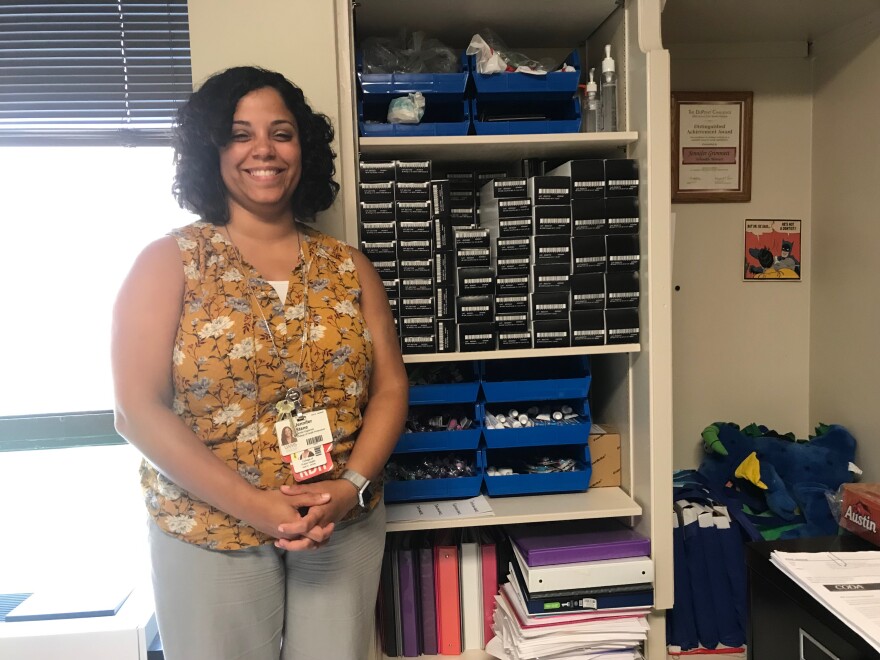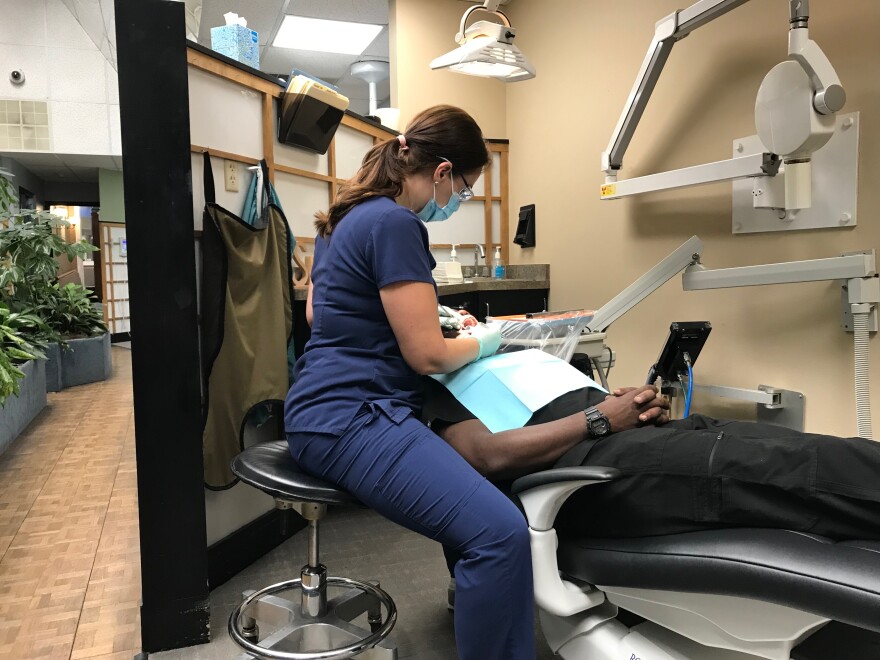Dental hygienists are starting to fill a crital gap in oral health in Arkansas, experts say, given the state has a shortage of dentists, especially in low-income rural districts.
The U.S. Department of Health and Human Services in 2015 reported that most states face a shortage of dentists. This is particularly bad news for rural states like Arkansas, which routinely ranks low in measurements for access to oral health. The report points out that, "this unmet demand will likely exacerbate access problems for underserved populations who forgo basic oral health care because of lack of proximity to a provider, inability to pay for care, and limited oral health literacy."
That same report suggests a possible solution – dental hygienists. Their numbers are growing, according to the American Dental Hygienists Association.
But Malinda Gamut, a dental hygienist who works at a private dental practice in Little Rock, says allowing hygienists to share some of the oral healthcare workload isn't as simple as it sounds.
"We like to talk about how cool it would be if we had a way to go to corporate offices," she cites as an example. "You know, pull up in [our] truck to Simmons Tower [in Little Rock] and have people come down and get their cleanings and exams done. We can't just run around like that. We have to have a dentist in tow."
The most common licensure for dental hygienists in Arkansas requires them to practice with a dentist on site. In a handful of states, such laws are even more restrictive. Louisiana, North Dakota, and Alabama prohibit hygienists from having direct contact with a patient until that patient has seen a dentist. On the other end of the spectrum, Wisconsin and California give dental hygienists the freedom to own and operate their own independent practices.

Rebekah Coffey is a dental hygienist with Arkansas Children’s Hospital in northwest Arkansas. Previously she worked out of state before signing on with ACH and has experienced varying degrees of professional freedom.
"As a dental hygienist, we know exactly what we have to do," Coffey says. "That's part of our training and we're able to do that without a dentist, but we have to legally have one present."
Coffey believes more Arkansas hygienists would perform cleanings and other routine oral hygiene in places like public schools, nursing homes, and prisons if the state laws were less restrictive.
The relationship between hygienists and dentists has come under legal scrutiny in recent years. In 2007 South Carolina's Board of Dentistry was sued by the Federal Trade Commission in Federal Court for violating antitrust laws. The Commission alleged the board had violated anti-competition laws by allowing dentists to dictate which patients could be seen by a hygienist, citing that "economically disadvantaged children," had limited access to preventive dental care. A similar case involving North Carolina's State Board of Dental Examiners was heard by U.S. Supreme Court in 2014.
In 2011, Arkansas adopted a set of laws allowing hygienists more options for seeing specific groups of patients without a dentist present -- if they get one of two permits. Collaborative Care Permit 1 allows hygienists to provide children in public settings, such as schools, routine dental care including flouride treatments, cleanings, and dental sealants. Collaborative Care Permit 2 extends the flexibility of the hygienist even further, allowing them to treat senior citizens and persons with developmental disabilities.
In both cases hygienists, however, must secure written agreements with a consulting dentists that operate out of brick and mortar locations. Additionally, insurers reimburse only the dentist, not the hygienist, for any work done, which may explain why few hygienists in the state have secured collaborative care permits.

Jennifer Stane, a dental hygiene instructor at the University of Arkansas For Medical Sciences in Little Rock, says she hopes Arkansas will expand the Collaborative Care model.
"It's a big step for Arkansas considering we didn't have anything remotely like that before, and in the South we tend to move at a little bit of a slower pace on big changes like that," she says.
Lindy Bollen, director of Arkansas’s Department of Oral Health, agrees. He says increasing the number of Collaborative Care-licensed hygienists could positively impact many Arkansans.
"[A] Collaborative Care measure would allow a dental hygienist to practice to the full extent of their ability with just a few limited restrictions and that will help improve access to care to patients that don't have the ability to take off a whole day to drive to a dental office. It's a good thing," says Bollen.
The Trump administration would like states to take it a step further. A report from the Department of Health and Human Services issued in 2018 titled “Reforming America’s Healthcare System Through Choice and Competition” includes the following recommendations:
- States should consider changes to their scope-of-practice statutes to allow all healthcare providers to practice to the top of their license, utilizing their full skill set.
- The federal government and states should consider accompanying legislative and administrative proposals to allow non-physician and non-dentist providers to be paid directly for their services where evidence supports that the provider can safely and effectively provide that care.
- States should consider eliminating requirements for rigid collaborative practice and supervision agreements between physicians and dentists and their care extenders (e.g., physician assistants, hygienists) that are not justified by legitimate health and safety concerns.
The report also recommends that states should evaluate emerging healthcare occupations, such as dental therapy, and consider ways in which their licensure and scope of practice can increase access and drive down consumer costs while still ensuring safe, effective care.
This story is produced by Arkansas Public Media, a statewide journalism collaboration among partner stations KUAR, KUAF, KASU and KTXK, and community partners AETN, and the Butler Center for Arkansas Studies. Arkansas Public Media’s series on oral health in Arkansas is funded through a grant from the Delta Dental of Arkansas Foundation, and with the support of its partner stations.
Support for this series on oral health in Arkansas comes from the Delta Dental of Arkansas Foundation, working to increase access to dental care in the state and improve the oral health of all Arkansans.




